A colleague of mine once said the Hindenburg disaster and H-bomb are two historic tragedies that have ruined the public’s perception of storing any amount of hydrogen in a mechanical device.
Although the improper use and storage of hydrogen can lead to fiery calamities, another fuel source can be equally dangerous if not more so: gasoline. It’s not as explosive as hydrogen, but when gasoline escapes its container it is actually more dangerous than hydrogen because it does not dissipate as quickly. That means it remains easily ignitable for much longer.
Safe and Effective
But public perception remains what it is and even if things were different in that regard, safety would still be the top priority. Consequently, Hyundai engineered the powertrain to be even tougher than necessary.
SEE ALSO: Hyundai Tucson Fuel Cell Lease to Cost $499 a Month
The Tucson Fuel Cell features dual tanks that are nearly impenetrable. Tests were conducted to ensure the tanks survive virtually any impact, included firing bullets at it. If any sort of rupture does occur, it’s designed to leak hydrogen at a rate that allows it to dissipate harmlessly into the atmosphere. Some experts claim it dissipates so quickly that if you held a lit match up to the leak it would only blow out. And if you’re still worried about safety, so far nearly 240,000 miles have been logged on the Tucson Fuel Cell in California without incident.
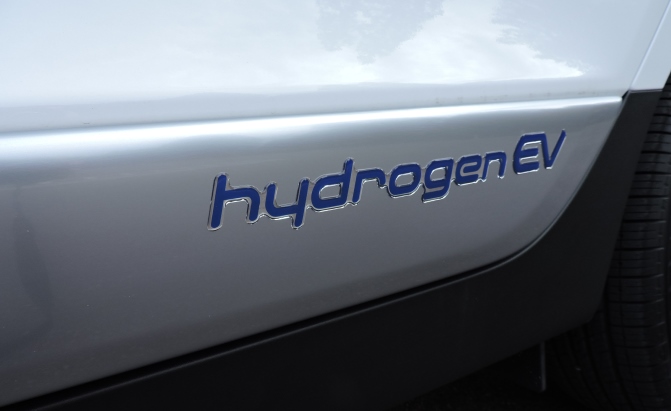
So What is a Hydrogen Fuel Cell?
Fuel cell vehicles use an electric motor for propulsion. But instead of a large battery pack, they draw energy from hydrogen fuel. Unlike fossil fuel burning setups, hydrogen fuel cell vehicles use some form of chemistry witchcraft that I’m not scientific enough to fully understand. Straight from Hyundai, the process works like this.
“Hydrogen enters the anode, air (oxygen) enters the cathode. A catalyst splits the hydrogen electrons and protons. The electrolyte conducts the positively-charged ions while blocking the electrons. The electrons are used to create an external circuit, generating electricity. The catalyst combines the hydrogen ions and electrons with oxygen to create water and heat energy. A single fuel cell produces approximately one volt; fuel cells are “stacked” to meet voltage requirements.”
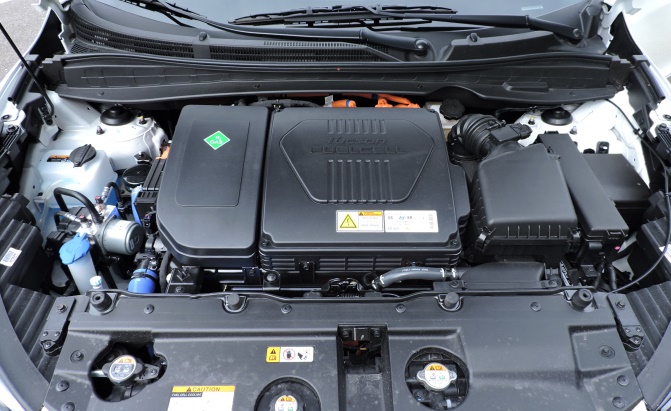
Torque vs. Weight
What all that means is that there’s enough electricity to generate 134 HP and 221 lb-ft. of torque from the Tucson’s 100 kW electric motor. That is significantly less horsepower than either of the Tucson’s regular gasoline engines, but a whole heap more torque, which is needed as converting the Tucson to a Fuel Cell vehicle has increased weight noticeably. It now tips the scales at 4,101 lbs., an increase of about 900 lbs. over a regular FWD Tucson.
Despite this heft, there is still decent acceleration as the vehicle sends power exclusively to the front wheels through a single-speed automatic transmission. Even at 70 MPH, the vehicle can still accelerate while climbing a minor incline. Operating silently most of the time, it’s only when you ask for full power that the drivetrain makes a faint little rumble.
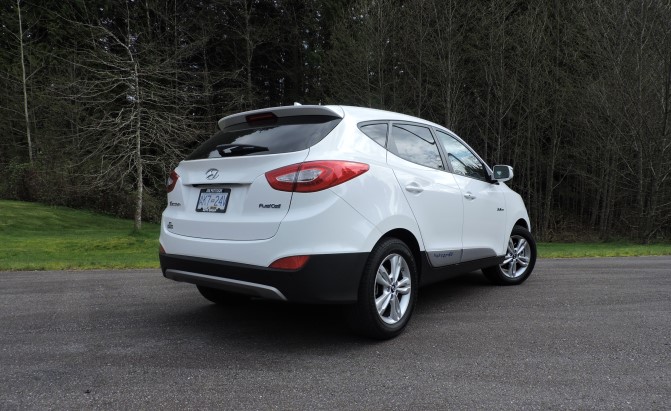
Drives Like a Quiet Tucson
An overused cliché when referring to electric and alternative fuel vehicles is to say they drive like regular cars. But with the Tucson Fuel Cell, there is no better way to describe it. Everything the vehicle does mimics an everyday, internal combustion Tucson.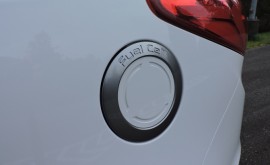 With music playing, it feels like I’m driving a vehicle with a very quiet engine. Nothing screams “hydrogen” or “electrically powered.”
With music playing, it feels like I’m driving a vehicle with a very quiet engine. Nothing screams “hydrogen” or “electrically powered.”
SEE ALSO: Hyundai Betting Big on Fuel-Cell Powered Tucson
The brakes are linear and don’t feel overly strained. The throttle modulation embodies that of a regular gasoline engine effectively. It’s been programmed perfectly with no sudden forward surge or jerkiness. Just depress it and the Tucson accelerates at the rate of speed you would expect it to.
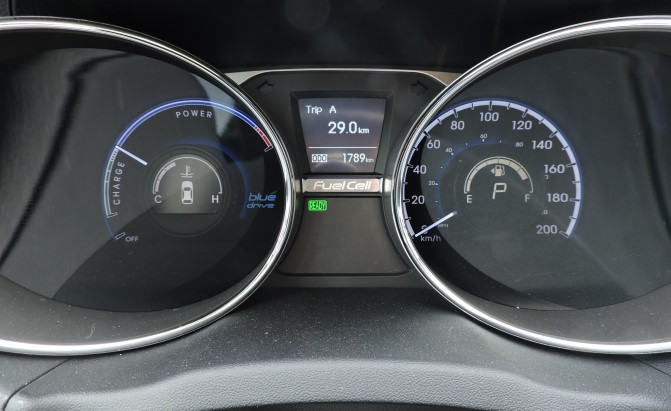
Efficient; or So I Hear
The Fuel Cell Tucson is efficient, rated at 49 MPGe city and 51 MPGe highway. But I can’t comment on actual fuel usage for two reasons. First, I’m not sure how much fuel I put into the Tucson’s dual 12.4-lb. hydrogen tanks. I filled up at a free refueling facility where numbers and specs aren’t overly shared. Second, there is no onboard fuel consumption calculator.
What I do know is when I left, the vehicle was reading 267 miles of total range and after driving it normally for a few hours, I was still on pace for that. That’s a bit lower than the official range of 300 miles, but I wasn’t exactly babying the Tucson and the conditions weren’t optimal for efficiency.
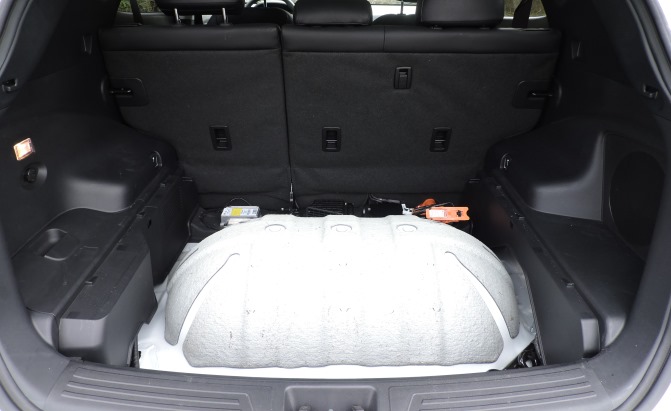
Subtle is the New Cool
Aside from badges and a gray ring around the fuel door, the hydrogen Tucson doesn’t do very much to broadcast its alternative powertrain to passers-by.
The driving position in the Fuel Cell remains the same as regular Tucsons and rear seat passengers have more than enough space, even if legroom shrinks marginally to 38.1 inches total. Cargo space takes a bigger hit as a giant white bulb of a fuel tank resides under the load floor. Still, at 23.8 cubic feet in total, you end up sacrificing less than two cubic feet.
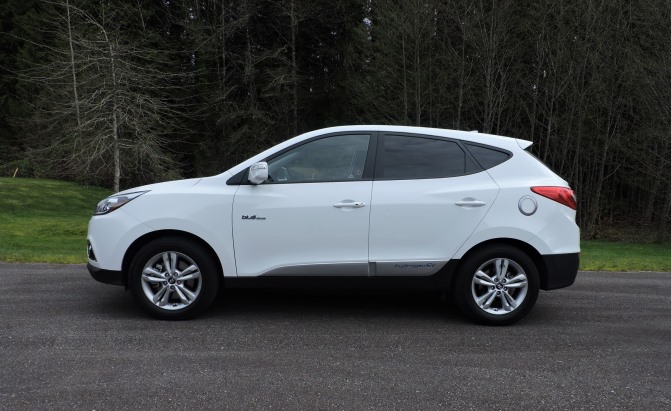
The Verdict
The Hyundai Tucson Fuel Cell really is a run of the mill Tucson that happens to be powered by an alternative fuel source. It’s remarkable how remarkably similar the Fuel Cell is from a regular Tucson. To me, that makes it the perfect hydrogen powered vehicle. Being able to be refueled exactly like a conventional gasoline vehicle and just as quickly, the Fuel Cell offers all the benefits of an electric vehicle without any range anxiety or a lengthy recharging time.
That brings up the biggest remaining problem and it’s not an easy one to fix: infrastructure. Aside from a few fueling stations in California and British Columbia where the Tucson is leased in small numbers, there just isn’t enough support for a mainstream Fuel Cell fleet. That’s really a shame, because it’s truly a terrific alternative to conventional motoring.
Discuss this story on our Hyundai Tucson Fuel Cell forum



Leave a Reply